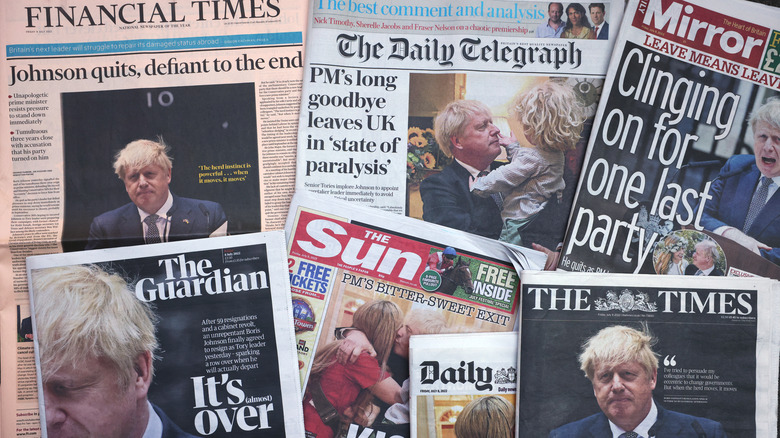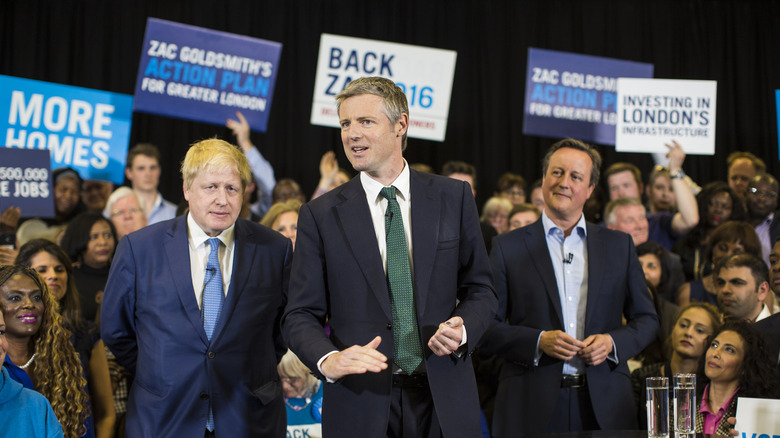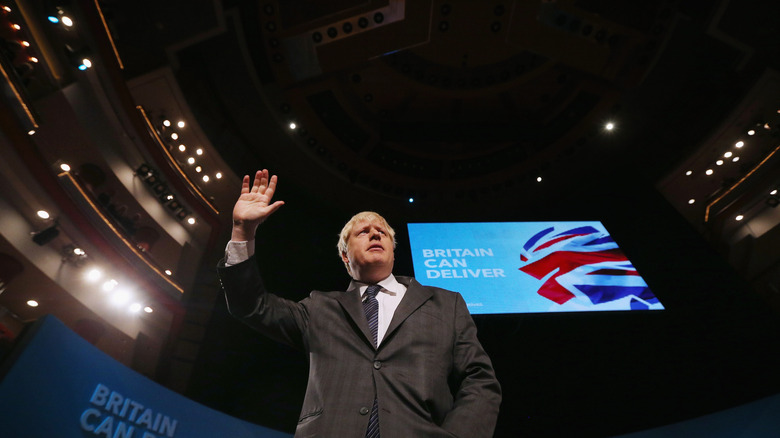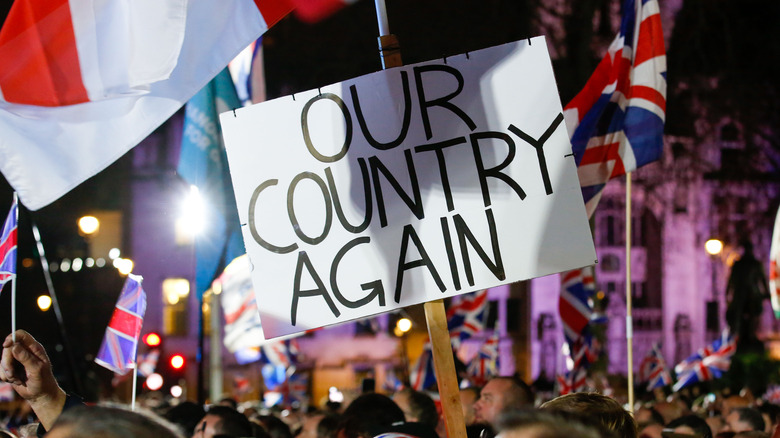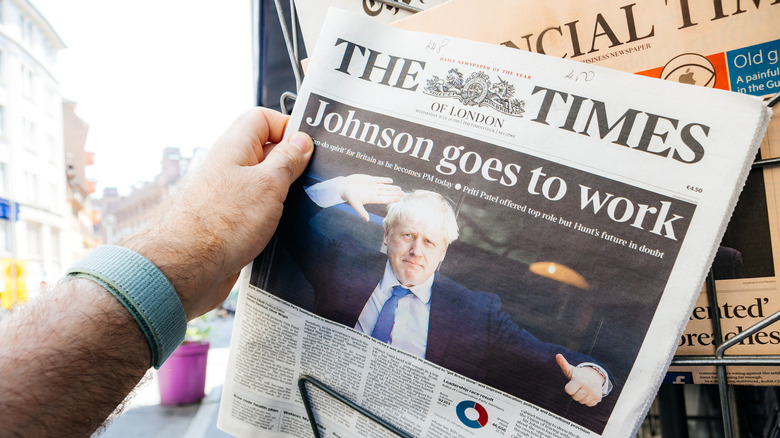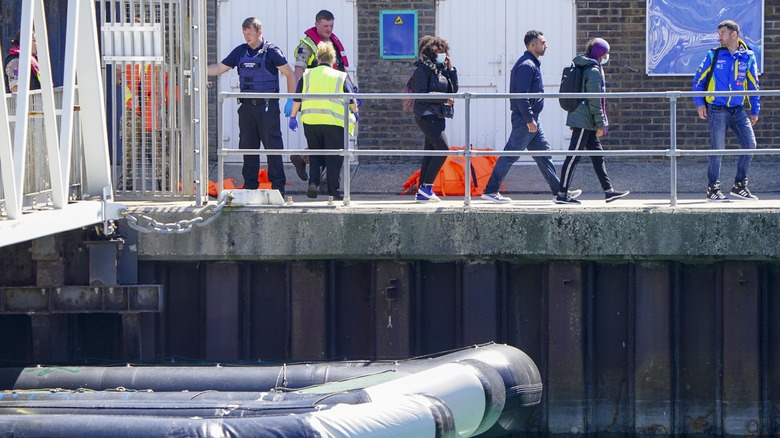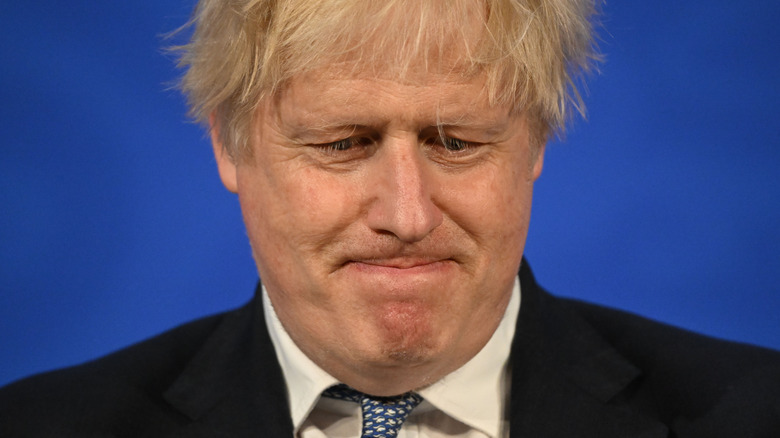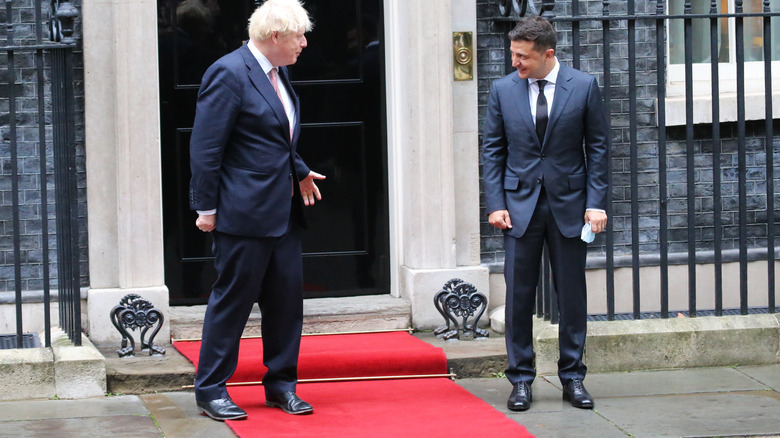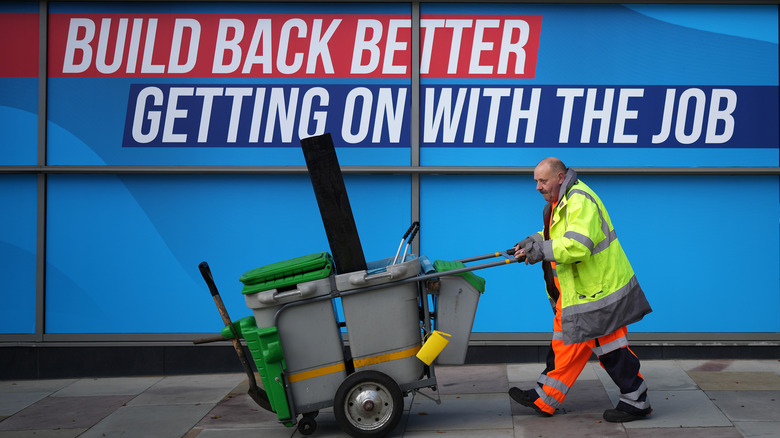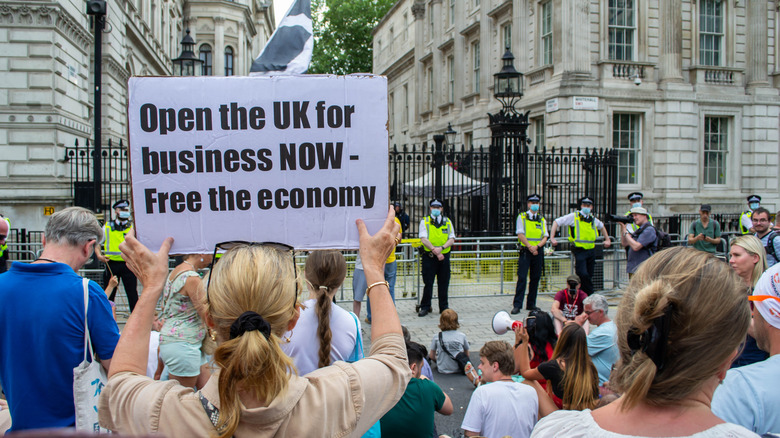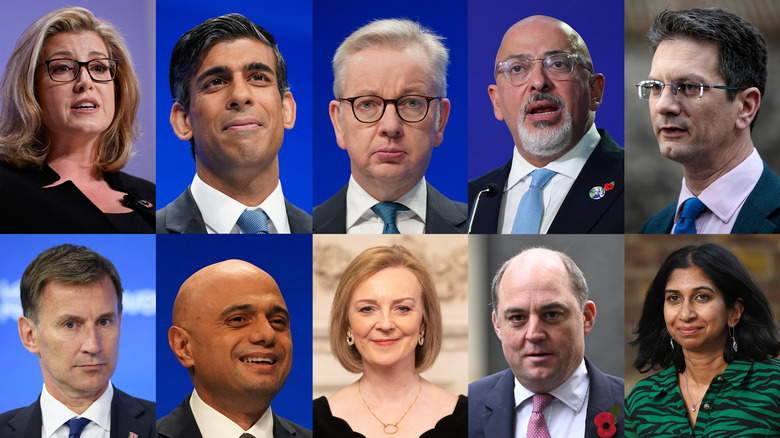Boris Johnson's Resignation Explained
British Prime Minister Boris Johnson's resignation in July of 2022 was not unexpected. According to Politico, it was surprising he made it as long as he did, and his Conservative Party simply had few other viable options that were at least discussing their concerns openly. Johnson's tenure was supposed to be marked by one issue — Brexit. All he was supposed to do was to pull Britain out of the European Union and be the frontman for the party.
Brexit happened, but Johnson did not move forward to make many changes after. Instead, his tenure as prime minister was marred by a handful of policy failures, the COVID-19 crisis, and numerous scandals that plunged his popularity to the point of a no-confidence vote that he barely survived (via NPR). Now, the public might been more forgiving of his personal scandals had he been a more effective prime minister, but he was not. Here is the background to Johnson's resignation and the policy failures that ultimately brought it about.
Early life
Boris Johnson was born in New York City to Stanley Johnson, who, per the U.K. magazine Politics served as one of the U.K.'s first representatives in the European Parliament. Stanley Johnson also had quite a distinguished ancestry on his father's side. According to the BBC, his father was the grandson of Ali Kemal, interior minister of the Ottoman Empire and enemy of modern Turkey's founder and hero Mustafa Kemal Ataturk. Meanwhile, he was also related to German nobility, hence his middle name "de Pfeffel."
With this kind of ancestry, it is unsurprising that a young Johnson gunned for top position in U.K. politics. According to his Columbia University World Leaders biography, he was educated at Brussels' European School before going on to the prestigious British school Eton. Per The Week, while at Eton, he rubbed shoulders with future politicians, including prime minister David Cameron, with whom he developed a rivalry that would extend into politics. After a series of stints in consulting, Johnson became a journalist before eventually being elected to Parliament. But he did not rise to national prominence until he campaigned for London mayor in 2008.
Mayor of London
Boris Johnson rose to power thanks to his tenure as mayor of London following a stint as a member of Parliament. As the Guardian reported back in 2007, the tough-talking, blunt politician ran on a law-and-order platform promising to curb rising crime. Johnson argued that vigorous prosecution of quality-of-life crimes (e.g. grafitti, public urination, fare-beating) would deter more serious crimes such as murder and burglary.
Johnson served two terms from 2008 to 2016, adding economic development to his second bid. His platform (via the City of London government website), proposed expanding the police, increasing green space, and ensuring a successful 2012 London Olympics that would bring investment and jobs to the city.
Voters considered Johnson's tenure a success. According to YouGov, wages went up, crime levels crashed, and undesirable parts of the city were rebuilt (via BBC). But London also became the world's most expensive city, and Intercept draws comparisons to New York under mayor Michael Bloomberg. Overall, 52% of Londeners polled said he had done a good job, while 29% disagreed.
From mayor to Brexit leader
Boris Johnson's mayoral tenure became a springboard back into national politics as the debate over the U.K.'s European Union membership raged. In 2016 the country held a referendum to leave the bloc. As reported in the Guardian, Johnson threw his support behind the "Leave" faction, despite pleas from his old friend Prime Minister David Cameron to change his mind.
Johnson's public reasoning was as follows: He did not oppose the European Union or the idea of greater cooperation with the mainland. But as his opponents in the prime minister's office noted, much of the British public – including Johnson himself – argued that the economic benefits of EU membership were outweighed by drawbacks such as open borders and excessive, inefficient bureaucratic interference from the EU Parliament in Brussels. This amounted to a subversion of British democracy, reported the BBC. So instead, Johnson proposed maintaining economic links with Europe in a similar manner that Canada maintained with the U.K. so that the island nation would not turn its back on the continent (via BBC).
Ultimately, the U.K. voted to leave the EU. According to the BBC, the greatest "Leave" share was in areas of Northern England, rural Wales, Eastern England, and among older native English voters. Younger voters, as well as urban voters in large cities like London, voted mostly "Remain." These key details should be kept in mind when discussing Johnson's premiership tenure, which he obtained as a result of the government's failure to deliver Brexit in the context of a host of other issues.
The premiership
In 2019, three years after the Brexit referendum, Teresa May's government had failed to deliver Brexit. Boris Johnson capitalized on popular discontent, per CNN, campaigning on the singular issue to "get Brexit done." British voters rewarded him and his Conservatives with about 44% of the vote in a stinging rebuke to the Labour Party, which lost its industrial, working-class strongholds to the Tories and Conservatives, per CNN. But it was also a boon for Johnson. As CNN noted, Johnson's coalition had a solid majority, allowing him to govern without having to account for harcore Leavers or Remainers.
Johnson, with his new mandate, promised to get Brexit done by the end of January 2020. But as France 24 noted, he accompanied it with the threat of a "hard Brexit," whose most immediate effects would have complicated freedom of movement and work rights for EU citizens in the U.K. (via ELA). These would be subject to the same immigration rules as non-EU citizens. In the end, Britain did leave the EU, although there are still a handful of issues at hand. But as the Atlantic notes, the British economy got worse. Now, not all of it was because of Brexit itself. Brexit did not change the underlying British economy, and Johnson's policies only made it worse or left the pre-Brexit status quo. First among those issues was a dear concern to the "Leave" faction — immigration.
The failure to curb immigration
Immigration, per an article published in the Population and Development Review, was the elephant in the room during the referendum. Leavers argued that immigration (mostly from Eastern Europe) provided an expanded pool of cheap labor, stagnating wages and straining taxpayer-funded social services. Brexit should have curbed this by eliminating the EU right to work. However, Johnson did not implement stricter controls. He actually expanded it. Per the Atlantic, the country kept the system that favored skilled immigrants while eliminating preferences for EU citizens. But otherwise, the numbers of legal immigrants remained unchanged. Then there was the lightning rod issue of undocumented immigration, mostly from Africa, Asia, and the Middle East.
Instead of taking a hard line that his base wanted, Johnson, per the Independent, discarded Theresa May's immigration plan that would have reduced immigration to five-figure levels and even floated an amnesty for half a million undocumented migrants. Johnson's own party, per the Financial Times, warned him that his soft views on immigration – particularly with regard to illegal migrant boat crossings (via RFI) – were costing him support. Once it emerged that the U.K. government was accommodating migrants in hotels to the tune of 4.7 million sterling per day (via the BBC) – all at the British taxpayer's expense (via the Times) – the public outrage intensified. None of this should have surprised British voters, as Johnson had called for an immigration amnesty in London in 2008, but it was still something of a betrayal of his working-class base that voted Conservative in 2019.
Let the bodies pile up
There might have been a chance to iron out the immigration problem, but Johnson soon became embroiled in a series of COVID-19-related scandals too. As the Institute for Government timeline shows, Boris Johnson locked down the U.K. three times, instituting measures such as 2-meter social distancing, masks, and school and business closures. Per CBS, they expanded to include COVID passes and vaccination mandates for healthcare workers, which proved to be unpopular per the Lancet.
Now, the real problem: The lockdowns, per the BBC, were based on a computer model by one Professor Neil Ferguson. In absence of a lockdown, he predicted a minimum of 250,000 deaths. Yet, once Ferguson was caught visiting his married lover in violation of his own rules, the British public began to question the COVID narrative. The English Parliament soon slammed Johnson's lockdowns and decried their economic devastation.
According to the Financial Times, MPs called the regulations "disproportionate" in regard to COVID's severity, which gutted the U.K.'s tourism and aviation industries. The British taxpayer was put on the hook for quarantine hotels and testing services that travelers were supposed to pay for themselves. On the other hand, those who accused him of not doing enough were enraged when rumor (via the Guardian) spread that he had told aides to "let the bodies pile high" in response to demands for stricter measures.
The British energy crisis
Top of Boris Johnson's agenda was the elimination of fossil fuels from the U.K. energy grid, per the Financial Post. Instead, the U.K. invested heavily in renewable energy sources while curbing domestic oil and coal usage. But as noted in National World, renewable sources were insufficient to meet energy demand, so the government made up the difference with foreign gas. Now, per the BBC, this worked as long as the country could afford to import Norwegian gas and offset any remaining needs with domestic North Sea production.
But then the Russian invasion of Ukraine happened. As noted in Bloomberg Europe, Russia cut gas supplies to Europe in retaliation to NATO sanctions. Although the U.K. barely imports Russian gas and was unaffected directly, the British consumer was still hit with an increase in wholesale gas prices, a situation exacerbated by a Norwegian gas sector strike. Thus, Johnson's government, per CNBC, faced an angry populace dealing with energy bill increases of nearly 700 sterling per year. In a country where the average income is about 31,000 sterling (via Statista), this situation is untenable, especially for the poor. Tracker Oil Price's Julianne Geiger argued that Britain's cost-of-living crisis was yet another nail in Johnson's political coffin, while his successors are likely to expand fossil fuels to meet demand and avoid gas rationing as is already happening in part of Germany.
The vice of vices
Johnson's numerous policy failures were worsened by a number of black marks to his character, the most damaging of which was his casual disregard for his own COVID rules. According to Yahoo News, he caused a major controversy after he was photographed not wearing a mask inside a hospital, despite strict regulations requiring everyone to do so. He was also photographed with 95-year-old David Attenborough without a mask, who, per Johnson's own health service, was considered a high risk for COVID death. In an interview with CNN's Christine Amanpour, he stumbled his way through an explanation but failed to convince his detractors.
Most infamous of all was the "Partygate" Scandal. In a Cabinet report, Sue Gray noted at least 12 instances in which 10 Downing Street – the PM's office and official residence – had held raucous parties while Britons were required to stay home with a few very narrow exemptions. Now, a handful of those attending, including Johnson himself, received fines. But the damage to his public image was done. While Britons were locked down, Johnson – the man that had imposed those rules – was hosting wild alcohol-soaked parties. As the New York Times noted, voters might have forgiven Johnson's questionable record, but "moral hypocrisy ... the vice of vices," was another matter for furious locked-down Britons. Johnson's approval collapsed, leaving him hanging on to Ukraine as his last resort.
The Winston Churchill imposter
Faced with calls to resign, Boris Johnson's only crutch became the war in Ukraine, which he was accused of using to distract from and ignore problems at home. Now, Johnson was a big ally of Ukraine's Volodymyr Zelensky, whose Ukrainian political allies called the British prime minister "Churchill-esque." Zelensky had good reason to like Johnson. The U.K., per Newsweek, was one of the first countries to supply weapons to Ukraine after Russia invaded in February 2022 alongside a promised $6.4 billion in aid. Per Radio Free Europe, the British army and government officials also called for more direct intervention. However, Johnson's Ukrainian commitments and Churchill comparisons sparked derision back at home – particularly when Johnson tried to claim wartime immunity to preserve his position.
In a New Statesman op-ed, historian Dominic Selwood argued that Johnson's claims to wartime immunity were ridiculous. Not only was there precedent for removing a wartime prime minister (for example, Herbert Asquith during World War I), the U.K. was not officially at war with anyone. So unless Johnson was willing to involve the U.K. in a hot war against Russia, Selwood slammed Johnson's posturing as a shameful exploitation of Ukrainian suffering to preserve his political position.
A Britain divided
Despite his many critics, Boris Johnson had an overwhelming mandate to govern. Thus, his resignation suggests that he lost his core constituency. Johnson's fall can be explained by the increasing detachment between the British elite in London and the populace outside the capitol. Per the Atlantic, Johnson came to power in the wake of a steep decline in standard of living. Britons found themselves, on average, 15% poorer than their German counterparts, with whom they had enjoyed economic parity as recently as 2010, and a whopping 30% poorer than the average American. Meanwhile, Southeastern England, particularly London, grew richer in part thanks to foreign investment and revitalization made possible through EU membership.
Johnson had promised to "level up" the areas of the country outside London. Brexit was supposed to keep more money in the U.K., but he failed to deliver. Now, the Atlantic argues that at the end of the day, Brexit wasn't entirely the problem (though it didn't make things better). Leaving or staying in the EU was not going to change the fundamental problem, namely that U.K. economic policies were favoring the formation of a wealth gap between the London elites and everyone else. Johnson's policies worsened matters, failing to offer new institutions or infrastructure projects in neglected regions nor even developing a vision for what revitalization and development would look like. As his base voters found their lives getting worse (alongside his many scandals), they joined his detractors to the point that everyone disliked him.
In the end, he alienated everyone
Perhaps Boris Johnson tried to be too clever, throwing half-measures to one side and rhetoric to the other but ultimately satisfying no one. For instance, per the Atlantic, he promised to curb immigration. Naturally, the British left savaged him in papers like the Financial Times. His supporters were delighted – until they realized that legal immigration numbers were unchanged while illegal immigration was up.
His environmental energy policy is another great example. As noted in Science Magazine, he took credit for reducing London's carbon footprint during his mayoralty and as prime minister committed the U.K. to going fossil fuel-free by 2035 (via Financial Post). This pleased environmentalists until he belatedly offered to expand domestic energy supply through fossil fuels and coal, per Sky. But this half-measure came too late for his base, which had already abandoned him as the cost-of-living increases in energy bills became unsustainable.
A Guardian op-ed by Guardian columnist Polly Toynebee argued that Boris Johnson was ultimately a do-nothing prime minister. He loved to talk tough political rhetoric but got little done, preferring to kick solutions to difficult problems down the road rather than tackling them head on – and that was in 2021. Looking at his record in 2022, Toynbee's conclusion appears to have been dead-on.
Now what?
Per CNBC, Boris Johnson's resignation has somewhat upended U.K. politics, although it was not completely unexpected either. Now, because a new PM must now be appointed, there is the question of whether Johnson will remain as caretaker. Members of practically every party have said they want him to go immediately, given the number of scandals and policy failures that have plagued his tenure. Currently, fellow Conservative Dominic Raab is the favorite to take his place on an interim basis. But what of his permanent successor?
Conservatives have floated electing one of Johnson's cabinet members to succeed him, such as Sajid Javid, Rishi Sunak, or Ben Wallace. Tory politician Steve Baker initially put his bid in for the position, though he's been a controversial figure in the British political scene, with his hardline views on both Brexit, opposition to zero-emissions policies, and support for increased domestic energy production, per Cornwall Live. However, per the Guardian, Baker has since decided to throw his weight behind Attorney General Suella Braverman. Regardless, the next PM will hold the unenviable job of guiding a country that is increasingly fractured and beset with internal problems, economic contraction, and increasing poverty.
